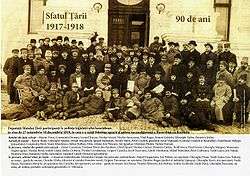Artur Văitoianu

Artur or Arthur Văitoianu (14 April 1864 in Izmail – 17 June 1956) was a Romanian general who served as a Prime Minister of Romania for about two months in 1919 (September 27 – November 30). During his mandate, the first elections of Greater Romania were held.
Career
Born in Izmail (in Bessarabia, now part of Ukraine), he rose through the ranks of the Romanian Army and, during the World War I Battle of Mărăști, he commanded the Second Corps.
Earlier in the War, he commanded the 10th Infantry Division in defense of the Prahova Valley. He managed to block the Central Powers from reaching Bucharest via the shortest way, thus preventing them from cutting off and surrounding the Romanian Army and by implication knock the country out of the war. It was a decisive victory that enabled Romania to wage war until 1918, when it had to surrender after Russia did the same, leaving Romania alone on the Eastern Front and surrounded by the Central Powers, a situation that far surpassed it's military capacities.
A War and Interior Minister in Ion I. C. Brătianu's cabinet, he came to lead the executive upon the latter's resignation over the Allied Powers' refusal to recognize the territorial awards promised to Romania upon its 1916 entry into the conflict (on the basis of Romania having signed a separate peace with the Central Powers, the Treaty of Bucharest, in the previous year); in the short hiatus, no Romanian authority was present at the signing of the Treaty of Saint-Germain with Austria.[1]
Văitoianu took office as Romanian troops were engaged in an expedition to Hungary, where they were fighting against the newly proclaimed Hungarian Soviet Republic. The Supreme War Council of Allied Powers gave Romania an 8-day ultimatum to retreat its troops from Budapest to the provisional border settled by the Paris Peace Conference and to cease confiscation of Hungarian property, as well as to sign the peace with Austria and agree to guarantee minority rights throughout Greater Romania.[1] Văitoianu's government refused to comply, and handed in its resignation on November 30, leaving room for the bloc formed in Parliament by the Romanian National Party of Transylvania and the Peasants' Party of the Regat to form the Alexandru Vaida-Voevod cabinet, one which soon agreed to the Allies' demands.[1]
He was a high-ranking member of the National Liberal Party-Brătianu for much of his political career.
Artur Văitoianu is buried in the World War I heroes' crypt in Mărășești.
Gallery
-

Sfatul Ţării Palace, December 10, 1918
Notes
References
- Keith Hitchins, România, 1866-1947, Humanitas, Bucharest, 1998 (translation of the English-language edition Rumania, 1866-1947, Oxford University Press, USA, 1994)
| ||||||||||||||||||||||
| ||||||||||||||||||
